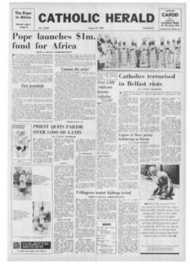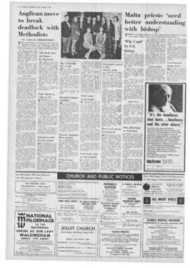Page 5, 8th August 1969
Page 5

Report an error
Noticed an error on this page?If you've noticed an error in this article please click here to report it.
Tags
Share
Related articles
Priest Quits Parish Over Loss Of Latin
Choral Exodus After Priest Downgrades Latin
The 'missa Normative'
The Liturgy And The People Unanimity For
Folk Mass Fashion
Sad yet hopeful symptoms in controversy over Mass
THE news that Fr. Bryan Houghton has resigned his parish rather than imposing the Missa Normativa is sad yet hopeful.
It is very sad when liturgical changes are so depressing that a priest feels unable to minister to the faithful in them. Yet it gives hope by drawing attention in a dramatic way to the distress Of many at what has happened, and is about to happen to the Mass.
Vatican II stated the general principle: "There must be no innovations unless the good of the Church genuinely and certainly requires them." (Liturgy Constitution No. 23.) The harm being done to the Church is obvious. The good is speculative.
1 still pray that Pope Paul will restore the Mass of St. Pius V. But if he orders us to accept the Missa Normative, 1 shall of -course do so. That is the only course for a Catholic. But it will he those who flout papal authority and reject transubstantiation who will rejoice. W. J. Morgan Rugby.
I GIVE you (with my own emphasis) a translation direct from the Latin of Vatican II's Constitution on the Sacred Liturgy, No. 4: "And so, in genuine accordance with tradition, this Sacred Council declares that Holy Mother Church regards as equally legitimate and worthy of respect all lawfully accepted rites, and desires them to be retained and guaranteed for the future.
She also wishes that, where necessary, they should be carefully and thoroughly revised in accordance with sound tradition, and given a new vigour in accordance with the circumstances and needs of today."
In No. 3, the Constitution states that its enactments are primarily concerned only with the Roman Rite; and the Commentary which accompanies the official text affirms that this is to be understood strictly of the Roman Rite alone (which we in England use) and not of any Oriental or even other Latin rites.
Mr. Brown has started off his letter of August 1 with a quotation of the first part of No. 4 (above), reserving its second part to a later point. He also makes a partial reference to the Constitution's No. 23, omitting however the significant final paragraph of this, which runs: "But let care be taken, as far as may be possible, that within the 'boundaries of adjacent regions notably different rites should be avoided," Still more, surely, within those of one and the same region!
The conclusions seem inescapable. The Missa Normativa will be the sole legitimate Roman Rite for the future. For it is none other than the pre-Conciliar Roman (Tridentine-Pian) kite itself as revised in accordance with the Council's mandate contained in the latter part of No. 4. It therefore takes the place of the Tridentine-Pian form of the Mass. which it makes obsolete.
As to whether the experts of the Consilium have "observed the Council's rules" or not. Mr. Brown is entitled to his personal opinion. In accepting and promulgating and imposing on the Latin Church the results of their labours. no less an authority than the Pope (backed up by last year's Synod of Bishops) evidently thinks they have.
Frank R. James Patcham, Brighton.
I WOULD like to encroach on your valuable space to record a big vote of thanks to the clergy of St. Charles Borromeo, Ogle Street. London. W.1, for the Normative Masses (now discontinued) they have celebrated on weekdays during the past few weeks.
The Masses I was fortunate enough to attend were marked by simplicity, reverence and clarity of diction: proving that the Normative Mass can be as beautiful as any Tridentine Mass — and infinitely more meaningful for the participants.
I urge those critics who live or work in London to experience the new liturgy at Ogle Street church before putting pen to paper. I guarantee them a rewarding and enlightening experience.
HOW many, asks Mr. Frank R. James (July 25) think the old Tridentine Mass was satisfactory?
I do, for one: together, no doubt, with millions of Catholics all over the world and throughout centuries, who have found in it the perfect utterance for the faith and worship of their Church.
Freda Bruce Lockhart London, W.8.
THANK you for publishing (July 18) the letter from Hugh Ross Williamson ("Pope Paul has set aside prohibition of St. Pius V").
That letter. better than anything I have yet seen, exposes the mentality of the diehard. reactionary hardliners, He implies, in all seriousness, that the personal opinions of a Pope can and should tie the hands of his successors for all time. The fact that Pius V has been canonised has no bearing on the case.
May the day not be far away, please God, when we shall read that the Pope has set aside Leo XIII's "condemnation" of Anglican Orders.
K. C. Morton Slough, Buckinghamshire.
LIKE Mr. W. A, Jones, of Dover (July 25) I request an authoritative explanation at the highest level as to how our reigning Pontiff can set aside the definitive pronouncement of Pope Pius V regarding the Holy Sacrifice of the Mass?
As Mr. Jones says, if this can be done then what of Leo XIII's binding decision on Anglican Orders?
Pat Robinson (Mrs.) Reading. London, S.W.20. Brian Wallace
blog comments powered by Disqus









